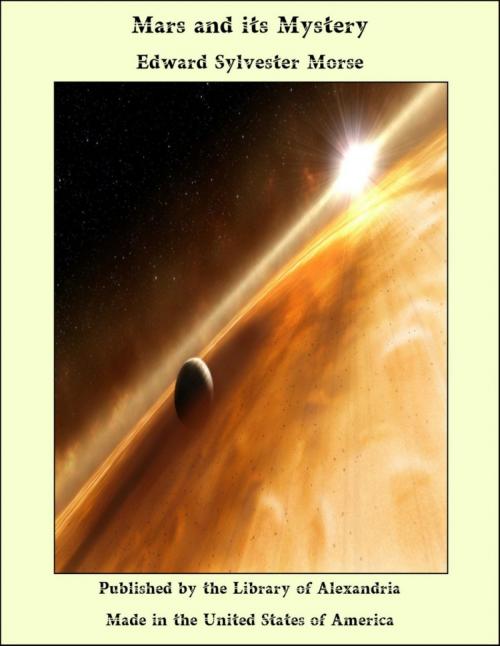| Author: | Edward Sylvester Morse | ISBN: | 9781465597670 |
| Publisher: | Library of Alexandria | Publication: | March 8, 2015 |
| Imprint: | Language: | English |
| Author: | Edward Sylvester Morse |
| ISBN: | 9781465597670 |
| Publisher: | Library of Alexandria |
| Publication: | March 8, 2015 |
| Imprint: | |
| Language: | English |
Had some one asked, fifty years ago, Is the Sun composed of chemical elements with which we are familiar? Shall we ever know? the question would not have been deemed worthy of a second thought. Realizing what has been accomplished, not only regarding the constitution of the Sun, but of the most remote stars, we are encouraged to ask: Is Mars inhabited? Shall we ever know? To what groups of students are we to appeal for an answer? If we want to know the diameter of Mars, its weight, the form of its orbit, the inclination of its axis, the period of its revolution around the Sun, and its rotation period, its ephemeris and its albedo, we ask the astronomer, for he has the instruments with which to observe and measure, and the mathematical knowledge necessary to reduce the measurements. If Mars were incandescent, we should appeal to the astrophysicist for informationregarding its chemical composition. If, however, we want to know the probability of Mars being the abode of life, we should appeal to one who is familiar with the conditions of life upon our own globe. If the question is asked as to the existence of intelligence on the planet, we endeavor to trace evidences of its surface markings, and their character, whether natural or artificial. Knowing how profoundly man has changed the appearance of the surface features of our own globe in the removal of vast forests, in the irrigation of enormous tracts of sterile plain, the filling up of certain areas, like Peking, Tokio, London, with material having a different reflecting surface, we are to scan the surface of Mars for similar modifications, and for an answer ask those who are familiar with physical geography, with meteorology, with geology, including the character of natural cracks or crannies, deep cañon, or range of mountains, or any of the great cataclysms which have scarred the face of the Earth. Taking the great mass of facts as they are presented to us by astronomers, to what class are we to appeal as to the probability of life in other worlds? What class will form the most rational conclusions? Will it be the circle-squarers, perpetual-motion cranks, spiritualists, survivals of a past who believe the world is flat, those who have "anthropomorphic conceptions of the Supreme" and Hebraic conceptions of the origin of things, or will it be those who value observation and experiment, who appreciate the importance of large numbers, and who are endowed with a tithe of imagination? Most certainly the latter class.
Had some one asked, fifty years ago, Is the Sun composed of chemical elements with which we are familiar? Shall we ever know? the question would not have been deemed worthy of a second thought. Realizing what has been accomplished, not only regarding the constitution of the Sun, but of the most remote stars, we are encouraged to ask: Is Mars inhabited? Shall we ever know? To what groups of students are we to appeal for an answer? If we want to know the diameter of Mars, its weight, the form of its orbit, the inclination of its axis, the period of its revolution around the Sun, and its rotation period, its ephemeris and its albedo, we ask the astronomer, for he has the instruments with which to observe and measure, and the mathematical knowledge necessary to reduce the measurements. If Mars were incandescent, we should appeal to the astrophysicist for informationregarding its chemical composition. If, however, we want to know the probability of Mars being the abode of life, we should appeal to one who is familiar with the conditions of life upon our own globe. If the question is asked as to the existence of intelligence on the planet, we endeavor to trace evidences of its surface markings, and their character, whether natural or artificial. Knowing how profoundly man has changed the appearance of the surface features of our own globe in the removal of vast forests, in the irrigation of enormous tracts of sterile plain, the filling up of certain areas, like Peking, Tokio, London, with material having a different reflecting surface, we are to scan the surface of Mars for similar modifications, and for an answer ask those who are familiar with physical geography, with meteorology, with geology, including the character of natural cracks or crannies, deep cañon, or range of mountains, or any of the great cataclysms which have scarred the face of the Earth. Taking the great mass of facts as they are presented to us by astronomers, to what class are we to appeal as to the probability of life in other worlds? What class will form the most rational conclusions? Will it be the circle-squarers, perpetual-motion cranks, spiritualists, survivals of a past who believe the world is flat, those who have "anthropomorphic conceptions of the Supreme" and Hebraic conceptions of the origin of things, or will it be those who value observation and experiment, who appreciate the importance of large numbers, and who are endowed with a tithe of imagination? Most certainly the latter class.















